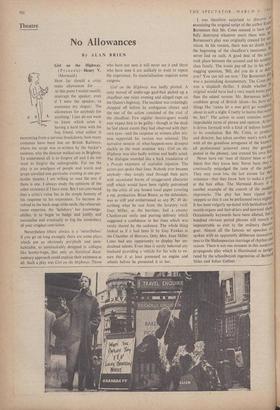Theatre
No Allowances
By ALAN BRIEN
How far should a critic make allowances for . . . At this point I would usually interrupt the speaker, even if I were the speaker, to announce my slogan : 'No allowances for anybody for A anything.' I just do not want to know which actor is having a hard time with his boy friend, what author is recovering from a nervous breakdown, how many costumes have been lost on British Railways, where the script was re-written by the backer's mistress, why the director walked out in Brighton. To understand all is to forgive all and I do not want to forgive the unforgivable. For me the play is an amalgam of 'people and words and props unveiled one particular evening at one par- ticular theatre. I am willing to read the text if there is one. I always study the opinions of the other reviewers if I have time. But I am convinced that a critic's value lies in the simple honesty of his response to his experience. To become in- volved in the back-stage tittle-tattle, the rehearsal- room expertise, the 'Salisbury' bar knowledge- ability, is to begin to hedge and justify and rationalise and eventually to fog the immediacy of your original conviction.
Nevertheless (there always is a 'nevertheless' if you go on long enough), there are some plays which are so obviously jerrybuilt and unin- habitable, so unmistakably designed to collapse like booby-traps, that only an historical docu- mentary approach could explain their existence at all. Such a play was Girl on the Highway. Those who have not seen it will never see it and those who have seen it are unlikely to want to repeat the experience. Its materialisation requires some exegesis.
Girl on the Highway was badly plotted. A tasty morsel of under-age gaol-bait picked up a chauffeur one rainy evening and alleged rape on the Queen's highway. The incident was irritatingly chopped off before its ambiguous climax and the rest of the action consisted of the trial of the chauffeur. Few regular theatre-goers would ever expect him to be guilty—though in the dock he lied about events they had observed with their own eyes—and the suspense as witness after wit- ness supported his version was minimal. The narrative tension of what-happens-next drooped slackly in the most amateur way. Girl on the Highway was also badly written and badly acted. The dialogue sounded like a hack translation of a Pravda exposure of capitalist injustice. The actors just spoke their lines. Nobody ever became anybody—they simply read through their parts with occasional bursts of exaggerated character stuff which would have been rightly patronised by the critic of any honest local paper covering a rep. production. Brian Reece, as the defendant, was as stiff and embarrassed as any PC 49 'de- scribing what he saw from the lavatory roof. Joan Miller, as the barrister, had a creamy Cheshire-cat smile and purring delivery which suggested a confidence in her lines which was rarely shared by the audience. The whole thing looked as if it had been lit by Guy Fawkes in the Chamber of Horrors. Only Mrs. Joan Miller Cotes had any opportunity to display her un- doubted talents. Even then it surely behoved any husband providing a vehicle Tor his wife to en- sure that it at least possessed an engine and wheels before he presented it to her. I was therefore surprised to discover ti examining the original script of the author Ernesr Borneman that Mr. Cotes seemed to have cart fully destroyed whatever merit there was. Mt' Borneman's play was originally created for tele vision. In his version, there was no doubt from the beginning of the chauffeur's innocence. Ile never lied on oath. A good deal of the actioe took place between the accused and his working; class family. The ironic pay-off lay in his wife( nagging question, 'Bill, did you do it or didn' you? You can tell me now.' The Borneman PleY was a painstaking documentary. The Cotes alai was a slapdash thriller. I doubt whether the original would have had a very much better pro than the edited version. Mr. Borneman lacks e confident grasp of British idiom—his hero saP f■ things like 'canna let a wee girrl go wanderill about in sich a night. Cruelty to bairns that would be, hm?' The action in court contains severe', improbable turns of phrase and opinion. At lead it drives forward with a kind of tedious honest/ to its conclusion. But Mr. Cotes, as product , and director, has taken another man's work and with all the grandiose arrogance of the know'it. all professional scissored away the genuine' pasted in the phoney, and created his own 11°P':' Never have our 'men of theatre' been so con' fident that they know best. Never have they Se continually misjudged the taste of the public' They may soon lose the last excuse for their existence—that they know how to make a i Polit at the box office. The Mermaid Henry V it another example of the conceit of the modern; impresario. 'The play has been ripped int° snippets so that it can be performed twice nightly; It has been vulgarly up-dated with battledress and mouth-organs and hair-driers and newsreel shots. Occasionally keywords have been altered, but a hundred obvious period phrases still remain 35 impenetrable as ever to the ordinary theatre' goer. Almost all the famous set speeches are spoken with an apparently deliberate insensitive' ness to the Shakespearian marriage of rhythm and reason. There is not one moment in this mediocre propaganda play which is illuminated or invig°: rated by the schoolboyish ingenuities of Bernard Miles and Julius Gellner.


































 Previous page
Previous page